BATTLEGROUND ANTARCTICA
A Cape Town ‘unwelcoming committee’ for Russian polar oil and gas survey ship
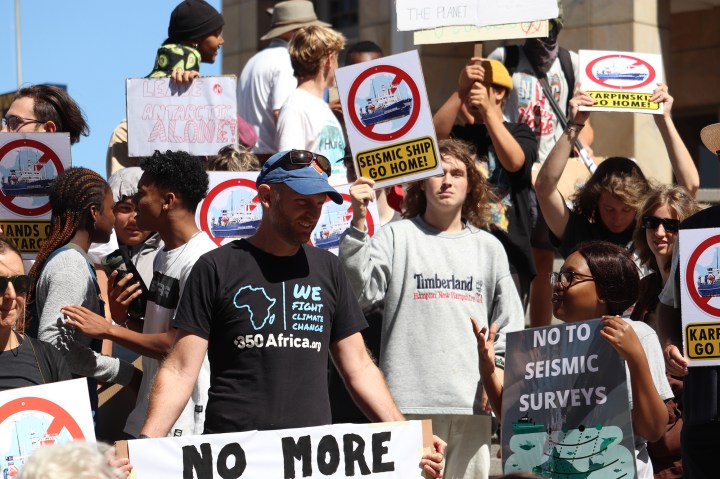
Local and international campaigners gathered in Cape Town on Thursday to protest against the planned arrival of the Akademik Alexander Karpinsky. This protest follows concerns that the vessel’s activities breach a ban on commercial mining in the Antarctic.
Though the Akademik Alexander Karpinsky did not meet her estimated time of arrival in Cape Town, she continues to chug her way down the west coast with her controversial seismic equipment aboard.
According to ship tracker Marine Traffic, the Russian seismic survey vessel was expected to dock in Cape Town at 11am on Thursday, January 26. But at the scheduled time, the Port of Cape Town saw no sign of the ship — instead becoming the setting of protests against the vessel’s ongoing use of South African facilities en route to the Southern Ocean.
At 10am, about 50 activists came together on the steps opposite the Zeitz Museum of Contemporary Art Africa. Where one might have expected to see art enthusiasts and tourists, this group of campaigners gathered to whale song played through a megaphone — and held up colourful signs reading: “Go Home” and “You are not welcome”.
Meeting at the popular V&A Waterfront tourist attraction, the mixed “unwelcoming committee” included Greenpeace Cape Town volunteers and members of Extinction Rebellion (XR) Cape Town and The Green Connection.
The campaigners made their way to the National Ports Authority on South Arm Road, waving placards. Here, they shouted slogans targeting the impact and motives behind the vessel’s seismic activities in the Antarctic.
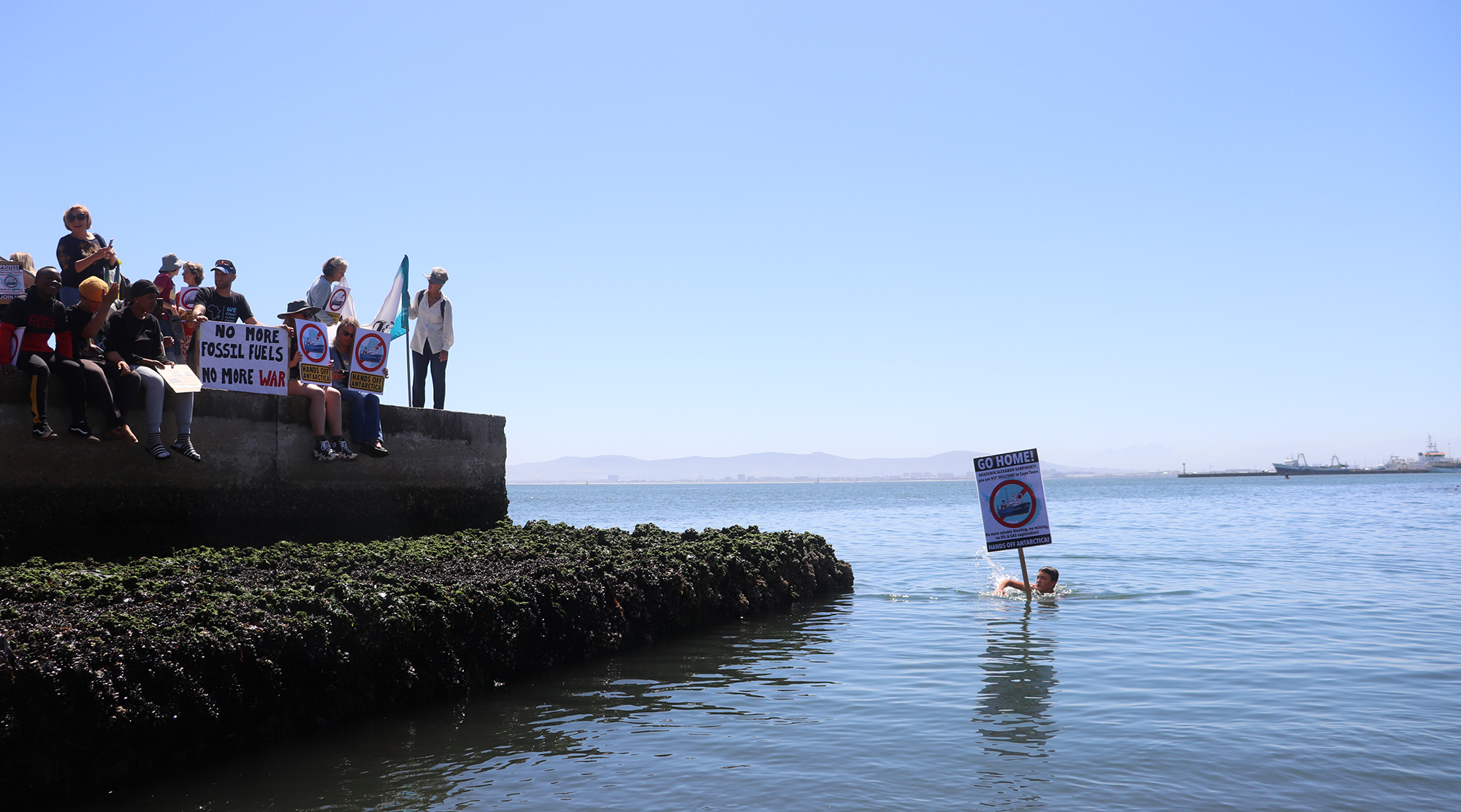
A young activist leapt into the water at the Port of Cape Town with a placard to the cheers of fellow protesters at the end of a march against the Akademik Alexander Karpinsky. (Photo: Jamie Venter)
Some jumped into the icy water, holding a “Hands Off Antarctica!” placard.
In the wake of Our Burning Planet investigations that exposed Russian oil and gas surveys, as well as marine noise, in the Southern Ocean, the event marked the first international protests to challenge these issues since a 1998 mining ban became law.
The blue and white-hulled Karpinsky is owned by the Polar Marine Geosurvey Expedition (PMGE), a subsidiary of the Kremlin’s mineral explorer, Rosgeo.
The investigative series details how the Karpinsky and her seismic airguns have travelled south annually for about 25 years, firing shots throughout the sensitive Antarctic region in search of hydrocarbons, the components that may form valuable oil and gas deposits.
The international mining ban does make provisions to allow scientific research under the Protocol on Environmental Protection to the 1959 Antarctic Treaty. But any stage of prospecting linked to commercial intent is prohibited, argue Antarctic governance experts.
As defined by an abandoned 1988 Antarctic mining pact, “prospecting” aims to identify “areas of mineral resource potential for possible exploration and development”.
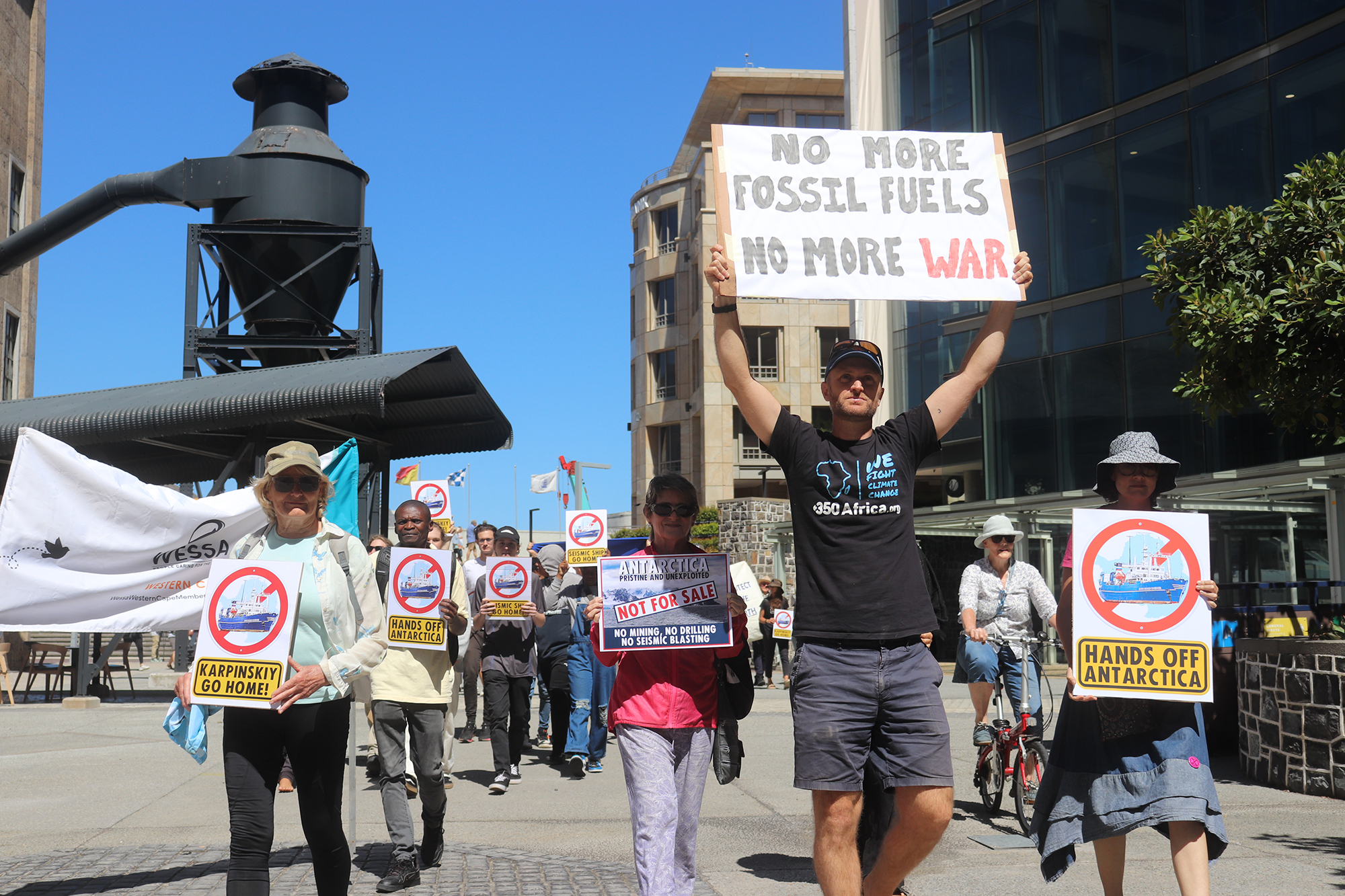
‘Hands Off Antarctica!’ protesters gathered at the Zeitz Museum of Contemporary Art Africa and walked to the National Ports Authority to demand that the Akademik Alexander Karpinsky be denied entry. (Photo: Jamie Venter)
Rosgeo has repeatedly told Our Burning Planet that its Antarctic work is simply standard geological research allowed for scientific purposes under the mining ban. “[However], there seems to be a thin line between science and the early stages of prospecting for mineral resources,” says Judy Scott-Goldman, spokesperson for XR Cape Town.
Peace and quiet
Scott-Goldman joined the protesters arguing that South Africa has a responsibility to uphold the treaty — it is one of just 29 decision-making states and the only African country with decision-maker rights through the Antarctic Treaty System (ATS).
The ATS says it devotes Antarctica to scientific and peaceful use.
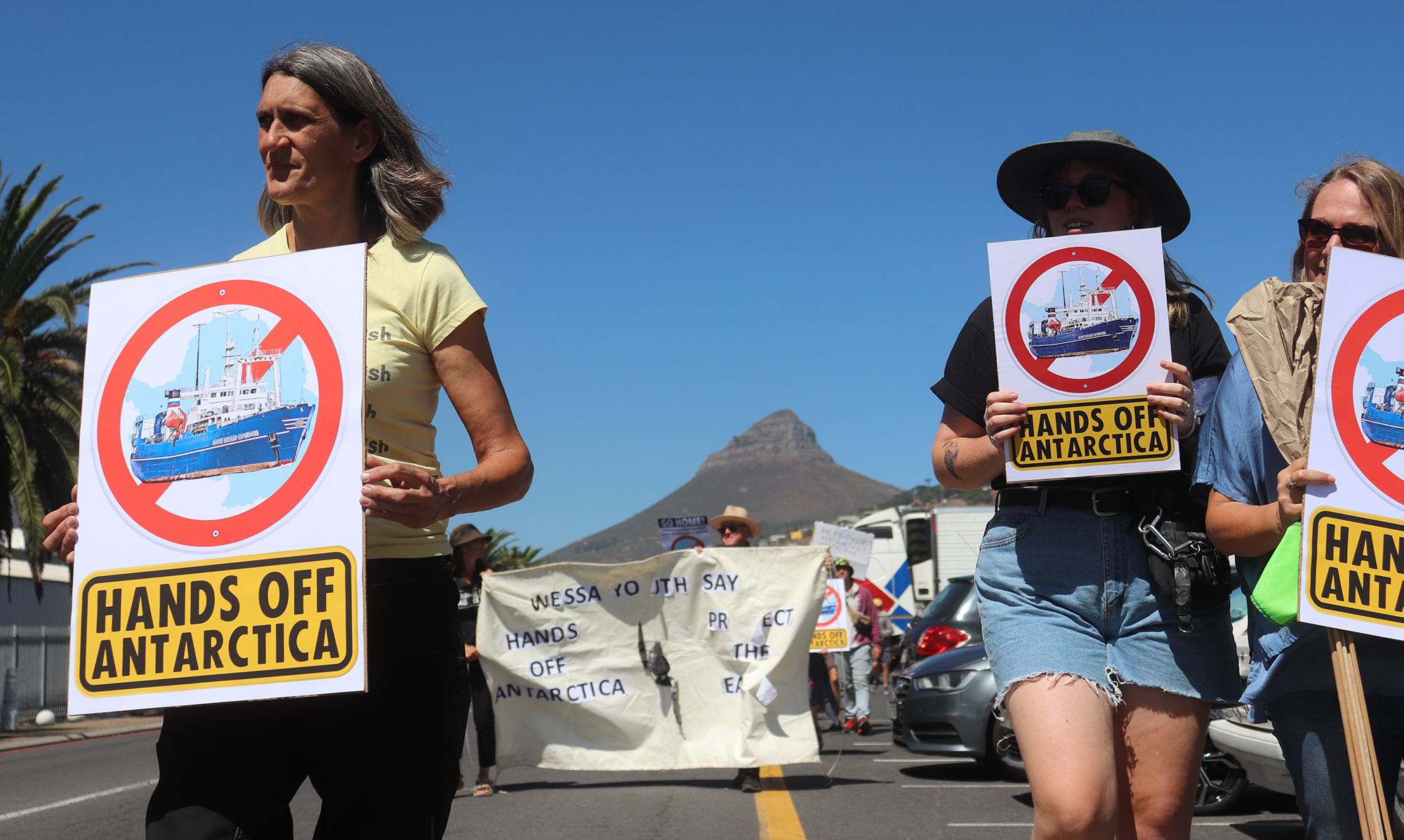
The imminent South African arrival of the Akademik Alexander Karpinsky has spurred protests against the vessel’s seismic activity due to potential impacts of such surveys on the sensitive Southern Ocean’s marine biomes. (Photo: Jamie Venter)
“We feel that if South Africa is part of this treaty, they shouldn’t be allowing companies that are openly saying they are looking for oil and gas in the Antarctic to use South African ports as a gateway to the Antarctic,” says Scott-Goldman.
The current seismic activity “constitutes a breach of the 55-nation ATS, to which both Russia and South Africa are signatories, under which resource exploration and extraction in the Antarctic region has been banned since 1998,” claim Greenpeace Cape Town volunteers and XE Cape Town in a joint statement.
Protester Jeanne-Marie Klopper expressed concern about the impact of seismic activity on the Southern Ocean’s delicate marine life.
“What we are trying to do with this protest is to get this on the international agenda. This is more than politics,” says Klopper.
“Marine mammals such as whales and dolphins rely on sound to navigate, communicate, feed and breed, so they are acutely sensitive to acoustic disturbance,” states a Greenpeace and XE Cape Town joint statement issued this week.
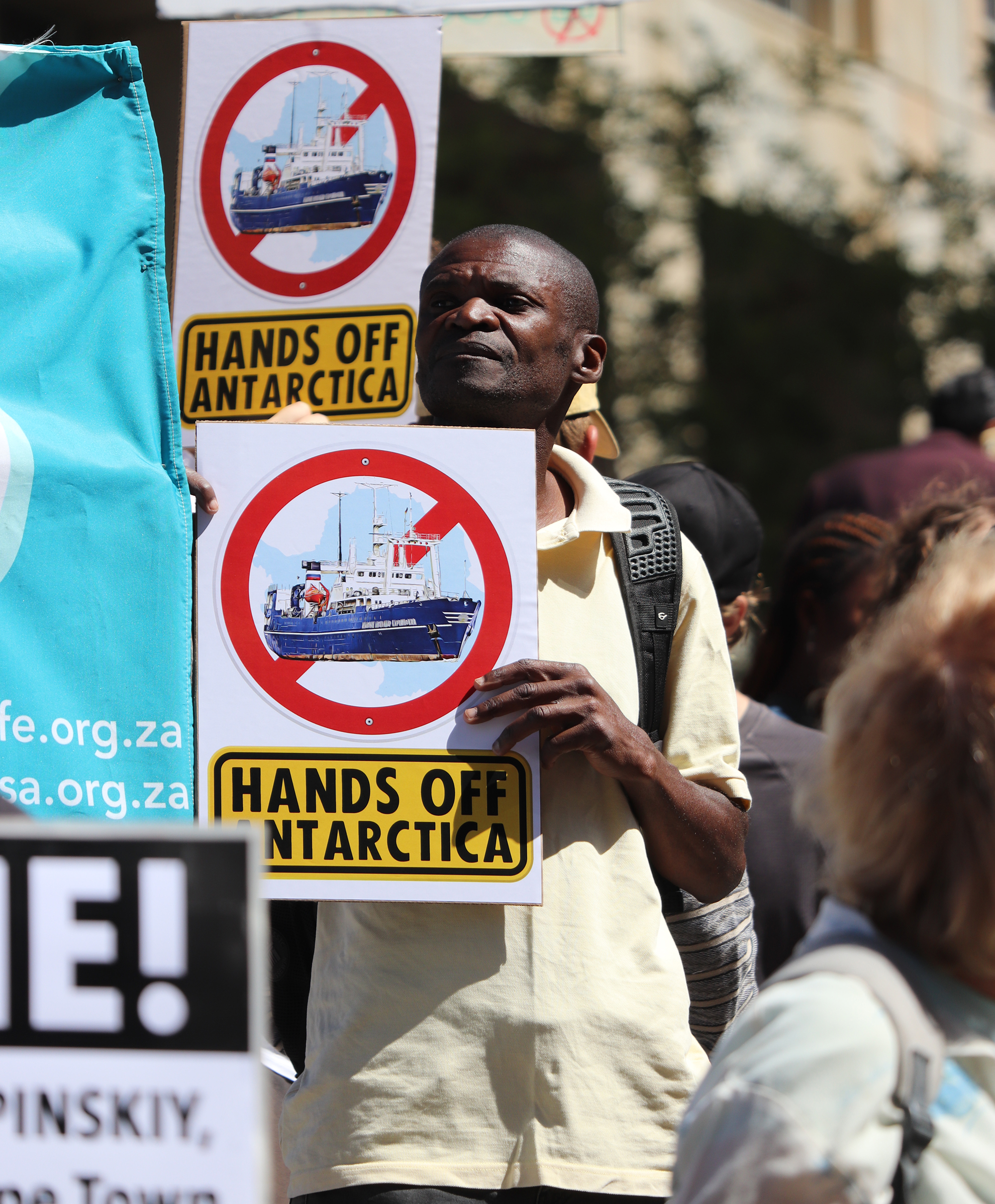
‘We can eat fish. But we can’t eat oil,’ says Themba George about the potential impacts of Antarctic seismic activity on South African fish resources. George is a volunteer with 350.org and attended recent protests against the Antarctic seismic survey ship, the Akademik Alexander Karpinsky. (Photo: Jamie Venter)
Themba George travelled from Khayelitsha to attend the protest. George highlighted the impact that activities such as seismic surveying and mining could have on the climate crisis.
“This is a protest of climate change. And our climate is being disturbed by conflict happening all over the world,” says George, who is a volunteer with 350.org, which describes itself as an “international movement of ordinary people working to end the age of fossil fuels”.
When asked about the planned arrival of the Russian ship, George noted: “We can eat fish. But we can’t eat oil.”
The Green Connection’s Nandipha Masango said: “I’m here to support this movement, which is … against any form of research, such as seismic surveys on the coasts of southern Africa, general ocean or Antarctic waters.”
The group was part of the coalition that successfully challenged Shell’s seismic surveys off South Africa’s Wild Coast — where the annual sardine run takes place.
“If there are certain oil spills, or certain incidents … in the Antarctic, they may also affect the coast of South Africa,” says Masango.
“Underwater noise may cause marine species not being able to communicate with each other, or they might simply migrate to other areas — shifting the food chain within the marine ecosystem.”
The remedy, she says, is for “no approaches even to take place”. This option, she argues, should include academic surveys that may be gathering Antarctic data for UN IPCC climate reports by relying on seismic blasts.
“It’s 2023,” Masango says. “We have done enough research to understand what our impact on the climate will be — and to determine what it takes to live environmentally sustainable lives.”
Not-so-welcome guest
The campaigners’ demands include that the Karpinsky and similar vessels “prove” they “have neither the intention nor the technologies to prospect for fossil fuel reserves in the Antarctic region, before being allowed to transit via South Africa”.
They are urging “the South African government to fulfil its moral duty towards its own citizens, as well as Africa and its future generations … by refusing port entry” to the Russian ship, and “all other vessels engaged in harmful exploration activities in the Antarctic region”.
Patrick Dowling, educational project manager at the Wildlife and Environment Society of South Africa (Wessa), says he brought a small group of home-schooled teenagers to expose them to environmental challenges.
Referring to the Karpinsky, he says: “We have this Russian ship; and their motherland has invaded a country. It’s the extension of a type of ongoing invasion — not just by the Russians, but by other countries too — that puts profit before the planet. The Antarctic is the last bastion of a pristine environment, and it should not be subject to this kind of exploration. As one of our kids’ banners says, ‘Exploration today, exploitation tomorrow.’ ”
Why the Karpinsky’s arrival has been delayed is unclear. But further protest action is planned, which is now expected over the weekend. A list of demands will be delivered to relevant authorities, according to Greenpeace Cape Town volunteers.
“We are absolutely using up the Earth’s resources faster than we can regenerate them,” says Scott-Goldman. “We are passing on a bankrupt planet to our children.”
South African authorities have not responded to repeated requests for comment. DM/OBP





















 Become an Insider
Become an Insider
Comments - Please login in order to comment.